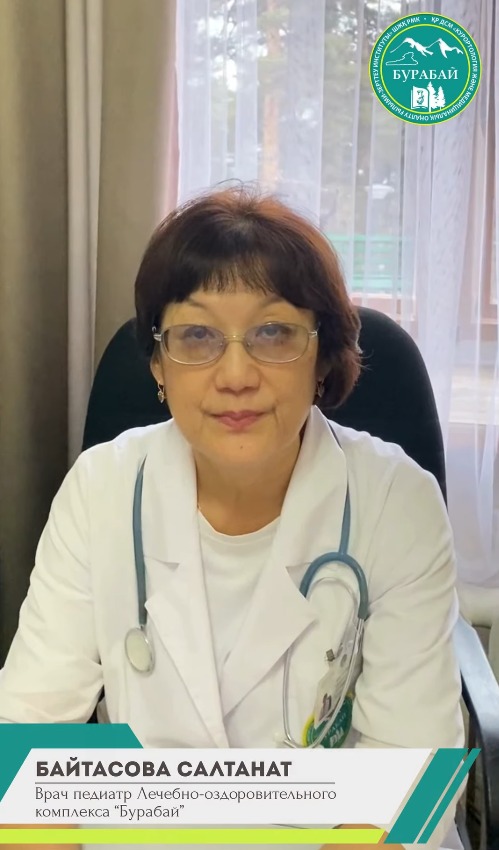Recommendations of Saltanat Baitasova, pediatrician at the branch of the Research Institute of Balneology and Medical Rehabilitation of the Ministry of Health of the Republic of Kazakhstan for the prevention of Acute Respiratory viral infections and influenza
Published by : Милана
Dear parents!
Every year in the autumn-winter period in Kazakhstan, there is a seasonal increase in the incidence of influenza and other acute respiratory viral infections. Comprehensive prevention remains the most effective and scientifically proven way to protect children.
Flu vaccination
The most reliable measure of specific prevention. Vaccination reduces the risk of the disease by 3-5 times and almost completely prevents severe forms and complications. It is not too late to vaccinate a child — immunity is formed within 10-14 days after vaccination. Free vaccination is provided to children from at-risk groups; for the rest, vaccines are available in pharmacies and private centers.
Observance of respiratory etiquette and hygiene
Frequent and thorough hand washing with soap (at least 20 seconds).
The use of disposable masks in public places and transport with high morbidity (change every 2-3 hours).
Covering your mouth and nose with a disposable handkerchief or elbow when coughing and sneezing.
Nasal mucosal care
Daily rinsing of the nasal cavity with isotonic solutions of seawater (after visiting children's groups and public places).
According to the indications, antiviral ointments and gels may be applied on the eve of the nose (on the recommendation of a doctor).
Maintaining an optimal indoor climate
The air temperature in the children's room is 18-21 °C.
Relative humidity is 40-60% (use humidifiers).
Regular ventilation of the premises.
Correction of vitamin D levels
Most children in Kazakhstan have vitamin D deficiency, which reduces antiviral immunity. It is recommended to take preventive doses of vitamin D3 in the period from September to April (the dosage is selected by the doctor individually depending on the age and level of 25 (OH)D).
Restriction of visits to crowded places during the period of rising morbidity
If possible, avoid shopping malls, cinemas, and long trips on public transport.
Timely isolation of patients
When the first signs of the disease appear, the child should stay at home for at least 5-7 days from the moment of normalization of temperature (without the use of antipyretics). This prevents the spread of infection in children's groups.
If a child has a high fever (above 38.5 °C), shortness of breath, severe lethargy, refusal to drink, seizures, seek medical help immediately.
Compliance with these simple but scientifically proven measures can significantly reduce the risk of illness and the severity of influenza and ARVI in children.
Take care of your children's health!
Every year in the autumn-winter period in Kazakhstan, there is a seasonal increase in the incidence of influenza and other acute respiratory viral infections. Comprehensive prevention remains the most effective and scientifically proven way to protect children.
Flu vaccination
The most reliable measure of specific prevention. Vaccination reduces the risk of the disease by 3-5 times and almost completely prevents severe forms and complications. It is not too late to vaccinate a child — immunity is formed within 10-14 days after vaccination. Free vaccination is provided to children from at-risk groups; for the rest, vaccines are available in pharmacies and private centers.
Observance of respiratory etiquette and hygiene
Frequent and thorough hand washing with soap (at least 20 seconds).
The use of disposable masks in public places and transport with high morbidity (change every 2-3 hours).
Covering your mouth and nose with a disposable handkerchief or elbow when coughing and sneezing.
Nasal mucosal care
Daily rinsing of the nasal cavity with isotonic solutions of seawater (after visiting children's groups and public places).
According to the indications, antiviral ointments and gels may be applied on the eve of the nose (on the recommendation of a doctor).
Maintaining an optimal indoor climate
The air temperature in the children's room is 18-21 °C.
Relative humidity is 40-60% (use humidifiers).
Regular ventilation of the premises.
Correction of vitamin D levels
Most children in Kazakhstan have vitamin D deficiency, which reduces antiviral immunity. It is recommended to take preventive doses of vitamin D3 in the period from September to April (the dosage is selected by the doctor individually depending on the age and level of 25 (OH)D).
Restriction of visits to crowded places during the period of rising morbidity
If possible, avoid shopping malls, cinemas, and long trips on public transport.
Timely isolation of patients
When the first signs of the disease appear, the child should stay at home for at least 5-7 days from the moment of normalization of temperature (without the use of antipyretics). This prevents the spread of infection in children's groups.
If a child has a high fever (above 38.5 °C), shortness of breath, severe lethargy, refusal to drink, seizures, seek medical help immediately.
Compliance with these simple but scientifically proven measures can significantly reduce the risk of illness and the severity of influenza and ARVI in children.
Take care of your children's health!

